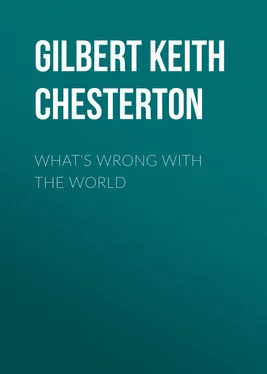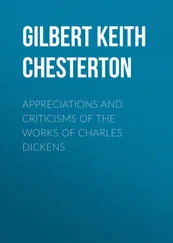Gilbert Chesterton - What's Wrong with the World
Здесь есть возможность читать онлайн «Gilbert Chesterton - What's Wrong with the World» — ознакомительный отрывок электронной книги совершенно бесплатно, а после прочтения отрывка купить полную версию. В некоторых случаях можно слушать аудио, скачать через торрент в формате fb2 и присутствует краткое содержание. Издательство: Иностранный паблик, Жанр: foreign_antique, foreign_prose, на английском языке. Описание произведения, (предисловие) а так же отзывы посетителей доступны на портале библиотеки ЛибКат.
- Название:What's Wrong with the World
- Автор:
- Издательство:Иностранный паблик
- Жанр:
- Год:неизвестен
- ISBN:нет данных
- Рейтинг книги:4 / 5. Голосов: 1
-
Избранное:Добавить в избранное
- Отзывы:
-
Ваша оценка:
- 80
- 1
- 2
- 3
- 4
- 5
What's Wrong with the World: краткое содержание, описание и аннотация
Предлагаем к чтению аннотацию, описание, краткое содержание или предисловие (зависит от того, что написал сам автор книги «What's Wrong with the World»). Если вы не нашли необходимую информацию о книге — напишите в комментариях, мы постараемся отыскать её.
What's Wrong with the World — читать онлайн ознакомительный отрывок
Ниже представлен текст книги, разбитый по страницам. Система сохранения места последней прочитанной страницы, позволяет с удобством читать онлайн бесплатно книгу «What's Wrong with the World», без необходимости каждый раз заново искать на чём Вы остановились. Поставьте закладку, и сможете в любой момент перейти на страницу, на которой закончили чтение.
Интервал:
Закладка:
But we have delayed the main argument too long for the parenthetical purpose of showing that the great democratic dream, like the great mediaeval dream, has in a strict and practical sense been a dream unfulfilled. Whatever is the matter with modern England it is not that we have carried out too literally, or achieved with disappointing completeness, either the Catholicism of Becket or the equality of Marat. Now I have taken these two cases merely because they are typical of ten thousand other cases; the world is full of these unfulfilled ideas, these uncompleted temples. History does not consist of completed and crumbling ruins; rather it consists of half-built villas abandoned by a bankrupt-builder. This world is more like an unfinished suburb than a deserted cemetery.
VI. THE ENEMIES OF PROPERTY
But it is for this especial reason that such an explanation is necessary on the very threshold of the definition of ideals. For owing to that historic fallacy with which I have just dealt, numbers of readers will expect me, when I propound an ideal, to propound a new ideal. Now I have no notion at all of propounding a new ideal. There is no new ideal imaginable by the madness of modern sophists, which will be anything like so startling as fulfilling any one of the old ones. On the day that any copybook maxim is carried out there will be something like an earthquake on the earth. There is only one thing new that can be done under the sun; and that is to look at the sun. If you attempt it on a blue day in June, you will know why men do not look straight at their ideals. There is only one really startling thing to be done with the ideal, and that is to do it. It is to face the flaming logical fact, and its frightful consequences. Christ knew that it would be a more stunning thunderbolt to fulfil the law than to destroy it. It is true of both the cases I have quoted, and of every case. The pagans had always adored purity: Athena, Artemis, Vesta. It was when the virgin martyrs began defiantly to practice purity that they rent them with wild beasts, and rolled them on red-hot coals. The world had always loved the notion of the poor man uppermost; it can be proved by every legend from Cinderella to Whittington, by every poem from the Magnificat to the Marseillaise. The kings went mad against France not because she idealized this ideal, but because she realized it. Joseph of Austria and Catherine of Russia quite agreed that the people should rule; what horrified them was that the people did. The French Revolution, therefore, is the type of all true revolutions, because its ideal is as old as the Old Adam, but its fulfilment almost as fresh, as miraculous, and as new as the New Jerusalem.
But in the modern world we are primarily confronted with the extraordinary spectacle of people turning to new ideals because they have not tried the old. Men have not got tired of Christianity; they have never found enough Christianity to get tired of. Men have never wearied of political justice; they have wearied of waiting for it.
Now, for the purpose of this book, I propose to take only one of these old ideals; but one that is perhaps the oldest. I take the principle of domesticity: the ideal house; the happy family, the holy family of history. For the moment it is only necessary to remark that it is like the church and like the republic, now chiefly assailed by those who have never known it, or by those who have failed to fulfil it. Numberless modern women have rebelled against domesticity in theory because they have never known it in practice. Hosts of the poor are driven to the workhouse without ever having known the house. Generally speaking, the cultured class is shrieking to be let out of the decent home, just as the working class is shouting to be let into it.
Now if we take this house or home as a test, we may very generally lay the simple spiritual foundations of the idea. God is that which can make something out of nothing. Man (it may truly be said) is that which can make something out of anything. In other words, while the joy of God be unlimited creation, the special joy of man is limited creation, the combination of creation with limits. Man’s pleasure, therefore, is to possess conditions, but also to be partly possessed by them; to be half-controlled by the flute he plays or by the field he digs. The excitement is to get the utmost out of given conditions; the conditions will stretch, but not indefinitely. A man can write an immortal sonnet on an old envelope, or hack a hero out of a lump of rock. But hacking a sonnet out of a rock would be a laborious business, and making a hero out of an envelope is almost out of the sphere of practical politics. This fruitful strife with limitations, when it concerns some airy entertainment of an educated class, goes by the name of Art. But the mass of men have neither time nor aptitude for the invention of invisible or abstract beauty. For the mass of men the idea of artistic creation can only be expressed by an idea unpopular in present discussions – the idea of property. The average man cannot cut clay into the shape of a man; but he can cut earth into the shape of a garden; and though he arranges it with red geraniums and blue potatoes in alternate straight lines, he is still an artist; because he has chosen. The average man cannot paint the sunset whose colors be admires; but he can paint his own house with what color he chooses, and though he paints it pea green with pink spots, he is still an artist; because that is his choice. Property is merely the art of the democracy. It means that every man should have something that he can shape in his own image, as he is shaped in the image of heaven. But because he is not God, but only a graven image of God, his self-expression must deal with limits; properly with limits that are strict and even small.
I am well aware that the word “property” has been defied in our time by the corruption of the great capitalists. One would think, to hear people talk, that the Rothchilds and the Rockefellers were on the side of property. But obviously they are the enemies of property; because they are enemies of their own limitations. They do not want their own land; but other people’s. When they remove their neighbor’s landmark, they also remove their own. A man who loves a little triangular field ought to love it because it is triangular; anyone who destroys the shape, by giving him more land, is a thief who has stolen a triangle. A man with the true poetry of possession wishes to see the wall where his garden meets Smith’s garden; the hedge where his farm touches Brown’s. He cannot see the shape of his own land unless he sees the edges of his neighbor’s. It is the negation of property that the Duke of Sutherland should have all the farms in one estate; just as it would be the negation of marriage if he had all our wives in one harem.
VII. THE FREE FAMILY
As I have said, I propose to take only one central instance; I will take the institution called the private house or home; the shell and organ of the family. We will consider cosmic and political tendencies simply as they strike that ancient and unique roof. Very few words will suffice for all I have to say about the family itself. I leave alone the speculations about its animal origin and the details of its social reconstruction; I am concerned only with its palpable omnipresence. It is a necessity far mankind; it is (if you like to put it so) a trap for mankind. Only by the hypocritical ignoring of a huge fact can any one contrive to talk of “free love”; as if love were an episode like lighting a cigarette, or whistling a tune. Suppose whenever a man lit a cigarette, a towering genie arose from the rings of smoke and followed him everywhere as a huge slave. Suppose whenever a man whistled a tune he “drew an angel down” and had to walk about forever with a seraph on a string. These catastrophic images are but faint parallels to the earthquake consequences that Nature has attached to sex; and it is perfectly plain at the beginning that a man cannot be a free lover; he is either a traitor or a tied man. The second element that creates the family is that its consequences, though colossal, are gradual; the cigarette produces a baby giant, the song only an infant seraph. Thence arises the necessity for some prolonged system of co-operation; and thence arises the family in its full educational sense.
Читать дальшеИнтервал:
Закладка:
Похожие книги на «What's Wrong with the World»
Представляем Вашему вниманию похожие книги на «What's Wrong with the World» списком для выбора. Мы отобрали схожую по названию и смыслу литературу в надежде предоставить читателям больше вариантов отыскать новые, интересные, ещё непрочитанные произведения.
Обсуждение, отзывы о книге «What's Wrong with the World» и просто собственные мнения читателей. Оставьте ваши комментарии, напишите, что Вы думаете о произведении, его смысле или главных героях. Укажите что конкретно понравилось, а что нет, и почему Вы так считаете.







